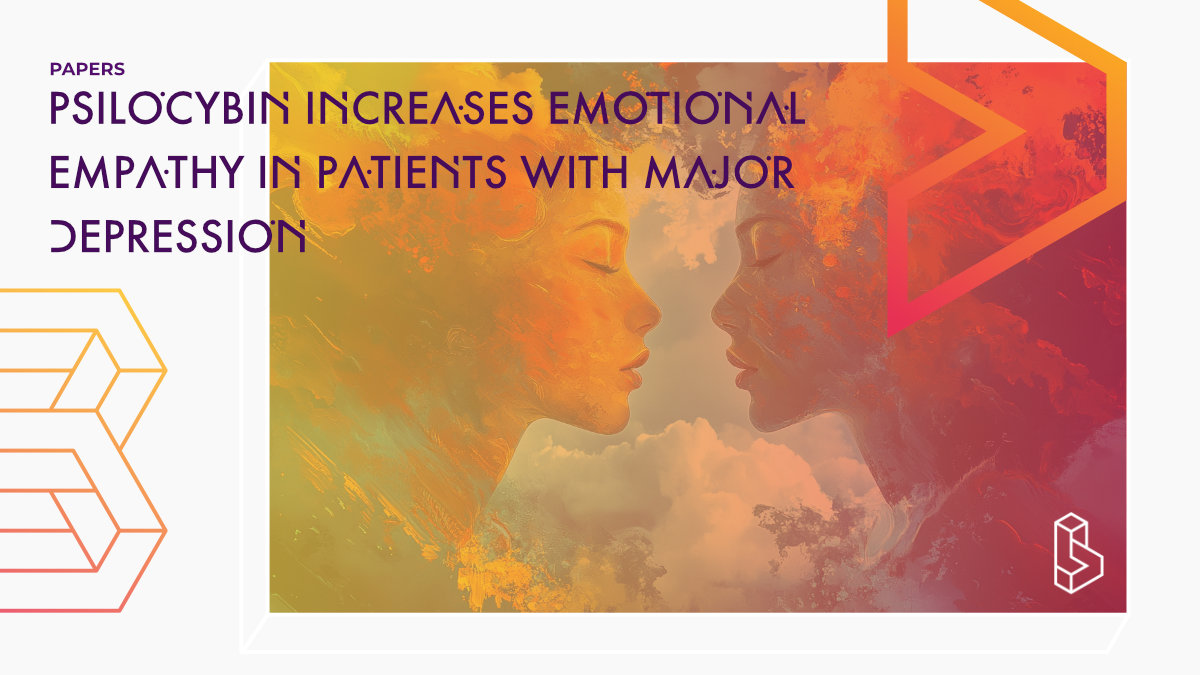This re-analysis of an RCT (n=51) investigates the effects of psilocybin-assisted therapy on empathy in depressed patients. Participants received either a single psilocybin dose (15mg/70kg) or placebo within a 4-week psychological support programme. Psilocybin significantly improved emotional empathy, particularly towards positive stimuli, for up to two weeks compared to placebo.
Abstract of Psilocybin increases emotional empathy in patients with major depression
“Empathy plays a crucial role in interpersonal relationships and mental health. It is decreased in a variety of psychiatric disorders including major depression. Psilocybin, a promising candidate for treating depression, has been shown to acutely increase emotional empathy in healthy volunteers. However, no study has investigated this effect and its relevance for symptom improvement in a clinical population. This study examines the enduring effects of psilocybin-assisted therapy on empathy in depressed patients using a randomized, placebo-controlled design. Fifty-one depressed patients were randomly assigned to receive a single dose of psilocybin (0215 mg/kg body weight) or a placebo embedded in a 4-week psychological support intervention. Empathy was measured using the Multifaceted Empathy Test at baseline and 2 days, 1 week, and 2 weeks after substance administration. Changes in empathy were compared between treatment conditions. Patients who received psilocybin showed significant improvements in explicit emotional empathy driven by an increase in empathy towards positive stimuli compared to the placebo group for at least two weeks. This study highlights the potential of psychedelics to enhance social cognition in individuals living with depression and contributes to a better understanding of the psychological mechanisms of action of psychedelics. Further studies are necessary to investigate the interaction between social cognition and clinical efficacy.”
Authors: Johannes Jungwirth, Robin von Rotz, Isabel Dziobek, Franz X. Vollenweider & Katrin H. Preller
Summary of Psilocybin increases emotional empathy in patients with major depression
Empathy, a fundamental aspect of social cognition, is crucial for maintaining interpersonal relationships and mental health. It enables individuals to recognise and respond to the emotions of others, promoting social bonding and cooperation. Empathy can be divided into two primary components—emotional empathy, which involves sharing and experiencing another person’s emotions, and cognitive empathy, which refers to the ability to understand and interpret those emotions.
Individuals suffering from psychiatric disorders, such as major depression, often exhibit impairments in empathy, which may contribute to social isolation and difficulty in interpersonal relationships. Treatments for depression typically focus on alleviating mood symptoms but do not directly address deficits in social cognition. Addressing these deficits may, therefore, represent an unmet therapeutic need.
Psilocybin, a serotonergic psychedelic compound, has demonstrated potential for alleviating depressive symptoms. It acts primarily through serotonin receptors (5-HT2A and 5-HT1A), inducing altered states of consciousness and promoting emotional and cognitive flexibility. Previous studies have shown that psilocybin acutely increases emotional empathy in healthy volunteers, but its long-term effects in clinical populations have not been systematically investigated. The current study aimed to assess the enduring effects of psilocybin-assisted therapy on empathy in patients with major depression, exploring both emotional and cognitive dimensions of empathy.
Methods
Study Design
Find this paper
Psilocybin increases emotional empathy in patients with major depression
https://doi.org/10.1038/s41380-024-02875-0
Open Access | Google Scholar | Backup | 🕊
Cite this paper (APA)
Jungwirth, J., von Rotz, R., Dziobek, I., Vollenweider, F. X., & Preller, K. H. (2024). Psilocybin increases emotional empathy in patients with major depression. Molecular Psychiatry, 1-8.
Study details
Topics studied
Depression
Study characteristics
Original Re-analysis
Placebo-Controlled
Double-Blind
Participants
51
Humans
Institutes
Institutes associated with this publication
University of ZurichWithin the Department of Psychiatry, Psychotherapy and Psychosomatics at the University of Zurich, Dr Mialn Scheidegger is leading team conducting psychedelic research and therapy development.
Compound Details
The psychedelics given at which dose and how many times
Psilocybin 15 mg | 1xLinked Research Papers
Notable research papers that build on or are influenced by this paper
Single-dose psilocybin-assisted therapy in major depressive disorder: A placebo-controlled, double-blind, randomised clinical trialThis double-blind placebo-controlled study (n=56) found that one psilocybin-assisted therapy (16mg/70kg, 2 prep + 3 integration meetings) session significantly reduced depressive symptoms (MADRS & BDI) in those suffering from a major depressive disorder (MDD, n=26). Fourteen days after the intervention, 54% of those in the psilocybin group met remission criteria (<10 on MADRS).
Linked Clinical Trial
Clinical, Neurocognitive, and Emotional Effects of Psilocybin in Depressed Patients - Proof of ConceptEffects of serotonin 2A/1A receptor stimulation by psilocybin on mood and emotion processing in major depressive disorder: a randomized double-blind placebo-controlled study

